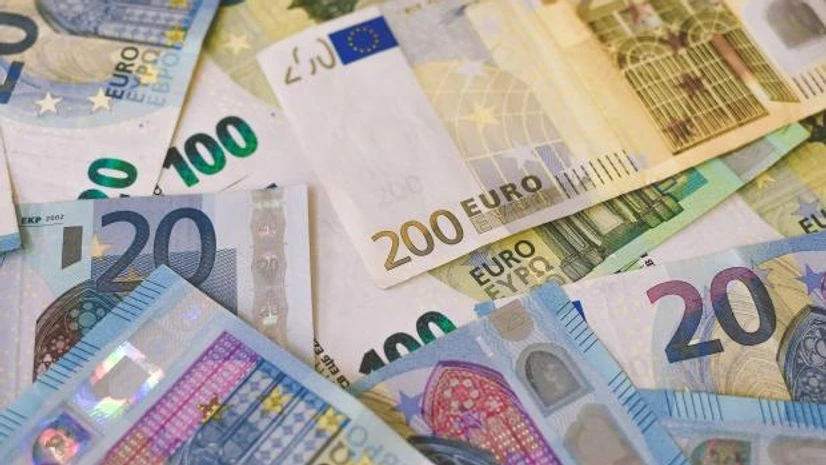By Marc Jones
LONDON (Reuters) - Benchmark European borrowing costs hit an 8-year high on Thursday and the euro fell as the European Central Bank signalled it will hike euro zone interest rates next month for the first time in a decade.
While the ECB's decision was widely expected by the markets for weeks, the possibility of a larger increase in interest rates from September weighed on sentiment at a time when the eurozone economy is grappling with slowing growth and soaring inflation.
"Markets currently point to an ECB policy rate peaking above 2%. We think this would make monetary policy restrictive, and doubt that the euro region's economy could sustain such tight conditions, given its present challenges," said Bill Papadakis, a macro strategist at Lombard Odier.
Bond dealers marked the moment by pushing Germany's 10-year government bond yield - the main proxy for European borrowing rates - to its highest level in nearly eight years at 1.41%.
Stocks, including banking shares which should be the primary beneficiary of higher interest rates, weakened and the euro fell a quarter of a percent [.EU] [/FRX]
More From This Section
With euro zone inflation at a record-high of 8.1% and broadening quickly, the ECB had already flagged a series of moves, including ending its long-running asset buying programme at the end of this month. Details were crucial though.
It spelled out that it plans to raise rates a quarter point next month and probably half a point in September, which would be the first 50-basis-point move in 22 years.
"I think in times of great uncertainty, gradualism is probably appropriate, more so than if the path is clear, well-identified and we all understand where we are heading," ECB President Christine Lagarde said.
The ECB also published new forecasts that raised its inflation projections to 6.8% for this year from 5.1% previously but it cut its growth outlook to 2.8% from 3.7% due to the impact of sky-high energy and food prices.
Graphic: Markets bet ECB will hike interest rates fast - https://graphics.reuters.com/EUROZONE-MARKETS/zdpxowdowvx/chart.png
European stocks were already on the defensive, led by miners as China imposed new COVID lockdown measures in Shanghai, while the financials sector fared marginally better with banks soon able to charge higher lending rates.[.EU][O/R]
Asian stocks had fallen overnight and Wall Street futures were broadly flat[.N], although it was more to do with the renewed rise in both global bond yields and the dollar, which will ultimately mean tighter financial conditions.
MSCI's broadest index of Asia-Pacific shares outside Japan was closing down 0.5%, with Australian shares finishing down 1.4% and Seoul's KOSPI flat. Hong Kong's Hang Seng turned around from small gains to fall 0.7% and Chinese A-shares fell 1%.
"It's classic pre-central-bank-meeting price action," Matt Simpson, senior market analyst at City Index in Sydney, said.
"It's the most exciting meeting since (Christine Lagarde) has been at the helm, since Draghi was here - 'whatever it takes'," Matt Simpson, senior market analyst at City Index in Sydney, said referring to the ECB meeting.
YEN LOWS
The other major focus for global investors was on the backsliding Japanese yen, which dropped to a 20-year low against the dollar of 134.56 before regaining a little ground. It is also nearing crucial levels against China's yuan which are highly sensitive for Asia.
The Japanese currency has been weighed down by a widening policy divergence, with the Bank of Japan remaining one of the few global central banks not signalling higher interest rates at present. [FRX/]
The global dollar index, which is up nearly 7% this year, was holding steady at 102.38, and the euro was at $1.0738 and testing 1.05 against the neighbouring Swiss franc.
The U.S. 10-year yield ticked up on Thursday to 3.0585% from a U.S. close of 3.029% on Wednesday and the two-year yield climbed to 2.815% compared with a U.S. close of 2.774%.
As investors digest the size and pace of ECB tightening in the coming months, they are also awaiting U.S. consumer price data on Friday which the White House has said it expects to be "elevated". Economists expect annual inflation to be 8.3%, according to a Reuters poll.
Oil prices were hovering near three-month highs at $123 a barrel in the commodity markets. On Wednesday, the Dow Jones Industrial Average fell 0.81%, the S&P 500 lost 1.08% and the Nasdaq Composite dropped 0.73%.
Graphic: Euro zone inflation is at record highs - https://fingfx.thomsonreuters.com/gfx/mkt/egpbkwxeovq/ecb0706.PNG
(Additional reporting by Andrew Galbraith in Shanghai, Editing by Raissa Kasolowsky, Catherine Evans, Andrew Heavens and Jane Merriman)
(Only the headline and picture of this report may have been reworked by the Business Standard staff; the rest of the content is auto-generated from a syndicated feed.)

)
